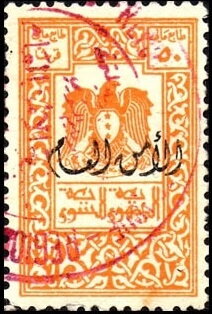Stamp: Coat of Arms (Hawk of Qureish) (Syria 1953)
Coat of Arms (Hawk of Qureish) (Syria 1953)
01 January (Syria ) within release General Security goes into circulation Stamp Coat of Arms (Hawk of Qureish) face value 50 Syrian piastre
| Stamp Coat of Arms (Hawk of Qureish) in catalogues | |
|---|---|
| Colnect codes: | Col: SY GS1953-02 |
Stamp is square format.
Fiscal stamp with a one-line "General Security" Diwani Arabic overprint in black Revenue Reverend cat. no: G202Also in the issue General Security:
- Stamp - Coat of Arms (Hawk of Qureish) face value 25;
- Stamp - Coat of Arms (Hawk of Qureish) face value 50;
- Stamp - Coat of Arms (Hawk of Qureish) face value 300;
- Stamp - Coat of Arms (Hawk of Qureish) face value 500;
- Stamp - Coat of Arms (Hawk of Qureish) face value 75;
- Stamp - Coat of Arms (Hawk of Qureish) face value 100;
- Stamp - Coat of Arms (Hawk of Qureish) face value 10;
|
Data entry completed
56%
|
|
|---|---|
| Stamp Coat of Arms (Hawk of Qureish) in digits | |
| Country: | Syria |
| Date: | 1953-01-01 |
| Perforation: | line 11-11½ |
| Emission: | Revenue |
| Format: | Stamp |
| Face Value: | 50 Syrian piastre |
Stamp Coat of Arms (Hawk of Qureish) it reflects the thematic directions:
Birds (Aves), a subgroup of Reptiles, are the last living examples of Dinosaurs. They are a group of endothermic vertebrates, characterised by feathers, toothless beaked jaws, the laying of hard-shelled eggs, a high metabolic rate, a four-chambered heart, and a strong yet lightweight skeleton. Birds live worldwide and range in size from the 5 cm (2 in) bee hummingbird to the 2.75 m (9 ft) ostrich. They rank as the class of tetrapods with the most living species, at approximately ten thousand, with more than half of these being passerines, sometimes known as perching birds. Birds are the closest living relatives of crocodilians.
Birds of prey or predatory birds, also known as raptors, are hypercarnivorous bird species that actively hunt and feed on other vertebrates (mainly mammals, reptiles and smaller birds). In addition to speed and strength, these predators have keen eyesight for detecting prey from a distance or during flight, strong feet with sharp talons for grasping or killing prey, and powerful, curved beaks for tearing off flesh. Although predatory birds primarily hunt live prey, many species (such as fish eagles, vultures and condors) also scavenge and eat carrion
A coat of arms is an heraldic visual design on an escutcheon (i.e. shield), surcoat, or tabard. The coat of arms on an escutcheon forms the central element of the full heraldic achievement which in its whole consists of shield, supporters, crest, and motto. A coat of arms is traditionally unique to an individual person, family (except in the United Kingdom), state, organisation or corporation.




